Did you ever think of essential oils as a solution? If you haven’t, I’m glad you are here reading this. Moving forward, you’ll know how potent essential oils are in treating anxiety. Welcome to a brand new universe!
Right before a meeting with the boss, you feel a knot in your tummy and fight the urge to pee. Being on stage with a mic in your hand reduces you to a pool of sweat. Do you have these episodes often? If yes, it’s time for you to take anxiety seriously.
Fear of facing the public, panic attacks, sweaty palms, dry mouth, urge to pee, shivering legs, fumbling speech, worry, dizziness, and sometimes losing consciousness can all happen because of anxiety. Oh! Marriage, relationships, and spouses can give you anxiety too!
Though we casually dismiss it, anxiety is not an uncommon phenomenon anymore. About 18.1% of the world’s population deals with anxiety every day! And how do we treat it? Just by popping a few antidepressants or sleeping pills?
Table Of Contents
What Are Essential Oils?
Essential oils or infusions are concentrated extracts obtained from various parts of medicinal herbs. These essences contain bioactive ingredients that have healing properties.
These oils can either be burnt to inhale their fragrance or applied (with medical advice) to the affected area for relief and a soothing effect. You should never ingest such oils because there is not sufficient research done to prove their safety.
You must be wondering how simply sniffing on some pleasant essential oils could possibly help you feel less anxious. Just keep reading to find out!
How Do They Work?
Essential oils stimulate your senses when they get absorbed by your body or when you inhale them. When you inhale fragrances in the atmosphere through your nose, the olfactory receptors get activated.
These receptors interact with specific proteins that open or close the ion channels of your brain lobes, while the olfactory cortex recognizes the odors and associates them with memories.
Depending on the type of odor – pleasant or unpleasant – different centers in your brain get activated by the signals sent through the olfactory sensory neurons. So, you could either feel alert or dull when you inhale certain fragrances.
For instance, lavender oil increases drowsiness while rosemary increases alertness. Chocolate fragrance reduces the level of attention while jasmine oil increases the feeling of well-being, freshness, and romance.
That’s how the essential oils in aromatherapy work. How beautifully we humans are wired, don’t you think?
Taking advantage of the stimulating effect fragrances have on our brain and body functions, we can manage anxiety and related symptoms effectively.
Can you use any essential oil for this?
That’s why you are here. Scroll down to find a list of the most effective essential oils for reducing those bouts of anxiety.
Top 10 Essential Oils For Battling Anxiety
1. Cannabidiol (CBD) Oil
Cannabidiol oil is a phytocannabinoid constituent of the plant Cannabis sativa. This essential oil does not possess any psychoactive properties.
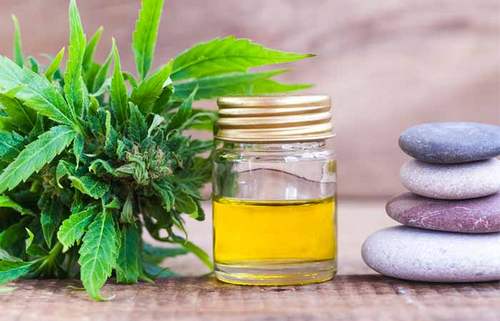
CBD oil has a therapeutic effect on your brain and nervous system. There is evidence that CBD oil can reduce anxiety related to multiple conditions like post-traumatic stress disorder (PTSD), generalized anxiety disorder (GAD), panic disorder (PD), social anxiety disorder (SAD), and obsessive compulsive disorder (OCD).
Further research needs to be done to determine the right dosage of CBD and the side effects it might have on the central nervous system.
2. Bergamot Oil
Bergamot essential oil is extracted from Citrus bergamia plant and is an instant mood booster. This oil contains limonene, myrcene, pinene, linalool, and citral in its volatile fraction, and pigments, waxes, coumarins, and bergamottin in its non-volatile fraction.
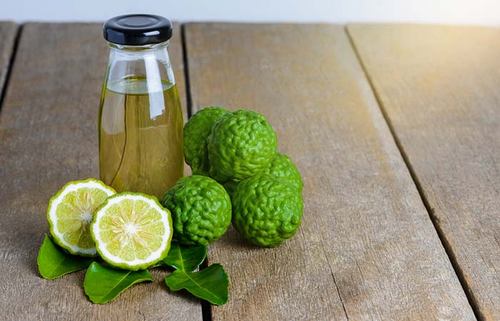
These active compounds in bergamot oil affect the central nervous system. The oil also has analgesic, anti-inflammatory, antimicrobial, and antiproliferative properties but is unstable in heat.
Though it is safe to inhale, the photosensitivity and phototoxicity of bergamot oil make it unsuitable for topical application.
3. Lavender Oil
The essential oil of lavender (Lavandula angustifolia) has antibacterial, antifungal, anxiolytic, antidepressant, analgesic, carminative (smooth-muscle relaxant), and vulnerary effects. Wow!
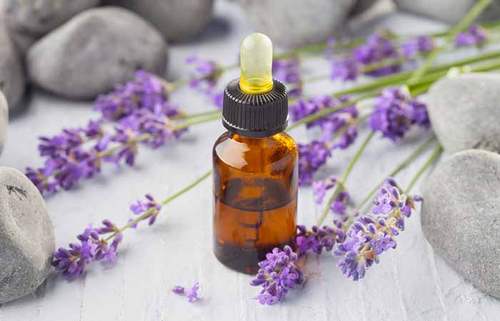
Traditional and folk medicine use lavender oil for reducing anxiety and depression. This has been supported recently by clinical data.
Lavender essential oil has concentrated lipophilic extracts of terpenoid constituents, such as linalool and linalyl acetate, which can penetrate the cell membranes and act on specific activity centers.
What’s best is lavender oil has almost no side effects and can be used for topical application, inhalation, and ingestion. It is still better to NOT ingest it because of insufficient data.
4. Frankincense Oil
Frankincense oil is extracted from the resin of the Boswellia serrata tree and has great therapeutic value because of its biochemical constitution. Traditional medicine in the East claims this oil to be anti-inflammatory, antiseptic, anxiolytic, tranquilizing, and antidepressant.
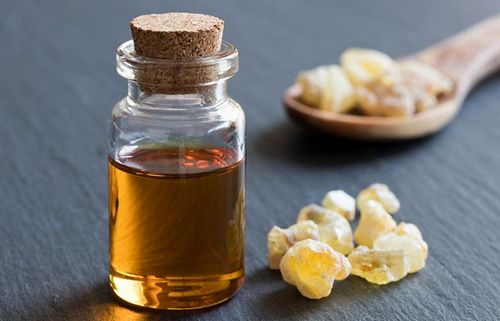
Frankincense oil has bioactive components, such as pinene, thujene, camphene, cymene, limonene, octyl acetate, and several mono- and diterpenoids.
Using frankincense oil in aromatherapy increases sleep, reduces anxiety, stabilizes hypertension, and gives a mild, warm sensation to your skin along with strong positive vibes because of its pleasant odor.
Think Tank!
Frankincense oil stimulates your brain’s limbic system – especially the amygdala and hippocampus – which are related to emotional behavior and memory. Perhaps that’s why it is used in rituals and religious functions as incense.
5. Clary Sage Oil
Clary sage essential oil is derived from Salvia sclarea and is known to clear the dark clouds of your mood.
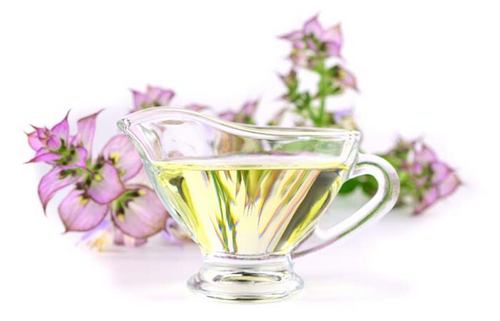
Clary sage oil has linalool and linalyl acetate that have an uplifting, antidepressant, sleep-inducing, and soothing effect on your body. It is also used as an aphrodisiac for the same reasons.
6. Rose Essential Oil
Rose oil is obtained from the petals of different Rosa species, especially Rosa centifolia L. and Rosa damascena Mill. The most abundant components of rose oil are terpenes, glycosides, flavonoids, and anthocyanins.

Due to the phytochemical composition of rose oil, it can reduce anxiety and depression and many other conditions. It is mixed with a variety of essential oils to create a relaxing effect on your body and mind.
Rose oil can reduce palpitations, blood pressure, and breathing rate, thereby calming you down. Apart from inhaling it, you can also use it in massage oils for topical application (6),.
7. Ylang-Ylang Oil
Cananga odorata is a plant that has sweet-smelling flowers, and that’s where you get the essential oil from.
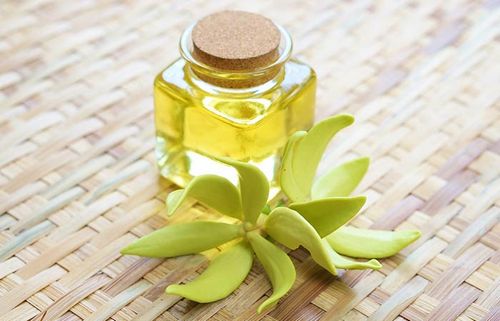
Ylang-ylang oil is derived from mevalonic acid, which gives it the characteristic revitalizing smell. Research shows that inhaling or massaging with ylang-ylang oil significantly reduces signs of anxiety like increased heart rate, sweating, and body temperature.
It reduces the serum cortisol and blood pressure levels in stressed individuals upon inhalation. But, there are cases in which topical application has resulted in irritation (8),.
8. Chamomile Oil
The beautiful chamomile flower and various parts of its plant (Matricaria chamomilla and Chamaemelum nobile) are used to make this essential oil.
Chamomile essential oil contains terpenoids (like chamazulene and bisabolol), sesquiterpenes (nobilin and epinobilin), flavonoids (angelic acid, tiglic acid, apigenin, luteolin, patuletin, and quercetin), hydroxycoumarins, coumarins (herniarin and umbelliferone), and several phenolic derivatives.
All these components together work on your body when you inhale it or massage it into your skin. The flavonoids bind to the GABA and benzodiazepine (BDZ) receptors on your brain and exhibit a mild sedative and calming effect.
9. Vetiver Essential Oil
Vetiveria zizanioides is a perennial grass growing in many tropical countries whose roots are processed to extract the essential oil.
It has potent antioxidant ingredients that deal with oxidative stress. Inhaling vetiver oil can stimulate the active centers of your brain, like the amygdala, thus increasing alertness and reducing anxiety and depression.
Vetiver oil also was found to have sedative and hypnotic effects on your brain – similar to chamomile oil. Its volatile components provide quick relief from anxiety and symptoms like temporary amnesia, blackouts due to fear, and insomnia.
10. Geranium Essential Oil
Apart from its pleasant aroma, geranium essential oil has anti-inflammatory, antidepressant, sedative, anxiolytic, and muscle-relaxing properties.
Geranium oil, derived from the plant Pelargonium graveolens, also facilitates blood circulation and eases breathing.
This essential oil is one of the most effective herbal essences for reducing menstrual-related anxiety. Inhaling geranium oil during labor and postpartum works wonders in reducing anxiety and hypertension.
It is noteworthy that the topical application of geranium oil might cause skin irritation and cross-reactions. So, mix it with carrier oils and add it to infusion burners.
Since you worked your way down here and now know the ‘what’ aspect of essential oils, let me tell you about ‘how’ they need to be used.
How Do You Use Essential Oils?
Most commonly, essential oils are used in two ways:
Inhalation
- You can add essential oils to oil burners so that their fragrance and active ingredients are spread in the environment surrounding you.
- Try using them in place of room fresheners, pillow mists, bathroom freshers, and incense sticks.
Topical Application
- The critical step here is to mix the essential oils in carrier oils because the former are highly concentrated extracts.
- Oils of almonds, jojoba, olive, coconut, castor, sesame, canola (rapeseed), grapefruit, argan, and avocado can be used to dilute these essential oils.
- Some oils can irritate your skin despite being diluted. Read and follow the instructions carefully or consult your doctor before applying them.
In Short…
Essential oils are a boon to mankind and make up a significant part of complementary and alternative medicine.
Steer clear of the undesirable side effects and complications of synthetic anxiolytic drugs. They are not natural, specific, and consistent.
Using essential oils to manage anxiety will also help you improve cognition, learning, memory, immunity, and various aspects of your physical and mental health. They are also great solace for your mind and soul.
If this article has inspired you to take the plunge, please like it and share your feedback, suggestions, experiences, and comments in the box below.
We’re waiting to know your favorite pick from the top 10!

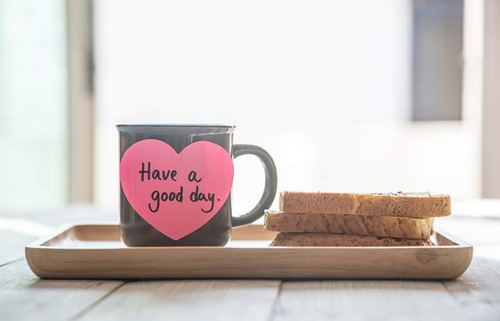
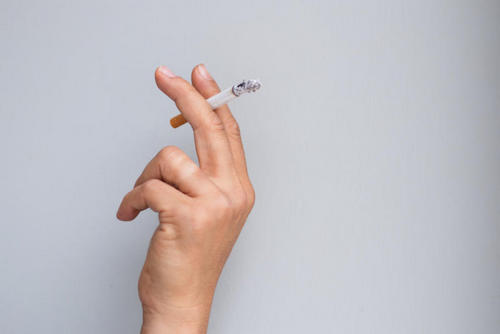

Very good, now you have made the decision not to be concerned, here is what you need to have to do rather:
If you want to obtain much more, merely fret considerably less!
With thanks! Valuable information!
With thanks! Valuable information!
Hi again
I have tried sending you a message on your site but I got an email saying it was not delivered so here goes again. It would be great if you could let me know if you have received my email and article.
I would like to contribute an article to your blog on how cryptocurrencies are reshaping the cannabis and CBD industry. I have used a couple of CBD sites in the UK to buy CBD oil using cryptocurrency. I realised just how much of an impact cryptocurrencies will have on the cannabis industry (which is heavily regulated) and I therefore decided to write this article. Hopefully, your readers will find it useful.
Hello there,
My name is Aly and I would like to know if you would have any interest to have your website here at osvilt.com promoted as a resource on our blog
We are in the midst of updating our broken link resources to include current and up to date resources for our readers. Our resource links are manually approved allowing us to mark a link as a do-follow link as well.
If you may be interested please in being included as a resource on our blog, please let me know.
Thanks,
Aly